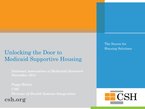Found 52 resources.
0
0
0
Topics: Asthma, Healthy homes, Housing, Housing Is Working Group, Mental health, Mobility
 Shared by Camille Anoll-Hunter
on Sep 13, 2023
Shared by Camille Anoll-Hunter
on Sep 13, 2023 0
0
0
This webinar will describe new research that shows children whose families participated in a program that helped them move from distressed neighborhoods to areas with lower rates of poverty experienced significant improvements in severe asthma episodes. Before moving, for every 100 children, there were approximately 88 severe asthma attacks per year. After moving, there were approximately 40 severe attacks per year, a reduction of more than 50%. The webinar will explore factors that help explain these changes in asthma, including the critical role of neighborhood-related stress, and describes...
Topics: Asthma, Healthy homes, Housing, Mental health, Mobility
 Shared by Camille Anoll-Hunter
on Sep 13, 2023
Shared by Camille Anoll-Hunter
on Sep 13, 2023 0
0
0
According to UN-Habitat, the world needs to build 96,000 affordable homes every day to address the
global housing crisis by 2030. Yet, better utilizing existing housing stock—through options such as shared
housing—can make a significant dent in the need to build more housing. With college students often
challenged to find affordable housing and many older adults living alone in homes with spare bedrooms,
these two groups are increasingly benefitting from living together. Universities are often well-suited to
facilitate students living and learning with older adults in nearby communities...
Topics: Community development, dual-generation initiative, Funding, Health, Homelessness, Housing, Mental health, Seniors, Youth
 Shared by Sandra Ware
on Oct 25, 2022
Shared by Sandra Ware
on Oct 25, 2022 0
0
0
During the COVID-19 pandemic, service coordinators played a pivotal role in the support of older adult residents of publicly funded housing properties. Some independent housing operators employ service coordinators to increase residents’ self-sufficiency, physical security, social connections, and the delivery of long-term community-based supportive services. This report presents results from a survey conducted between June 23 and July 17, 2020 to explore the experiences of these service coordinators during the early months of COVID-19. At the time of the survey, about one-third of...
Topics: Community development, Housing, Mental health, Seniors
 Shared by Housing Is
on Dec 3, 2020
Shared by Housing Is
on Dec 3, 2020 0
0
0

Opened in summer 2018 on the north side of Columbus, Ohio, Laurel Green Apartments is an affordable permanent supportive housing development for residents with mental health conditions.
Topics: Homelessness, Housing, Low-income, Mental health, Supportive housing
 Shared by Housing Is
on Jun 11, 2019
Shared by Housing Is
on Jun 11, 2019 0
0
0
Stable housing plays a vital role in people’s recovery from substance use disorders (SUDs). An inability to pay rent and the threat of losing housing can lead to stress that triggers substance misuse and relapse. People experiencing homelessness who also have SUDs typically find it difficult to address their substance use without a safe place to live, because they often use alcohol or drugs to cope with the dangers of life on the streets. In 2018, Congress passed the SUPPORT for Patients and Communities Act (known as the SUPPORT Act), which provided a variety of new programs and funding...
Topics: Homelessness, Housing, Legislation & Policy, Low-income, Mental health, Research, Substance abuse
 Shared by Housing Is
on May 2, 2019
Shared by Housing Is
on May 2, 2019 0
0
0

The county’s preliminary results look promising: more than 78% of Vital clients were booked into jail less often once enrolled in the program for at least six months. On average, Vital participants went to jail about a third less often per year compared to the three years before their enrollment. A typical client had at least two fewer bookings into a King County Jail compared to the three years before entering the program.
Topics: Criminal justice, Health, Homelessness, Housing, Mental health, Partnerships, Substance abuse
 Shared by Housing Is
on Apr 25, 2019
Shared by Housing Is
on Apr 25, 2019 0
0
0
The Legal Bibliography is collection of 100+ papers, toolkits and other materials focused on privacy, consent and policy documentation. Co-developed by the Network for Public Health Law and Data Across Sectors for Health (DASH), the Bibliography is a growing resource for lawyers and community data practitioners, intended to support local collaboratives in their efforts to share data across sectors.
Topics: Criminal justice, Data sharing, Education, Health, Homelessness, Housing, Mental health, Partnerships, Safety
 Shared by Housing Is
on Apr 8, 2019
Shared by Housing Is
on Apr 8, 2019 0
0
0
Federal safety net programs are intended to protect the most vulnerable Americans—such as the elderly, people with severe disabilities and young children. Housing assistance plays a critical role in the safety net, providing decent, safe, and affordable housing for millions of extremely low-income and vulnerable families—though, because it is not an entitlement like other federal safety net programs, the assistance available falls far short of the need. Housing subsidies free families to spend on other essentials like healthy food, education, and health care.
Topics: Asset building, Dual-generation, Education, Housing, Mental health, Mobility, Partnerships, Research, Workforce development
 Shared by Housing Is
on Apr 2, 2019
Shared by Housing Is
on Apr 2, 2019 0
0
0
Homelessness during pregnancy poses significant health risks for mothers and infants. As health care providers increase their emphasis on social determinants of health, it is important to understand how unstable housing contributes to complications during pregnancy. We linked data about emergency shelter enrollees with Massachusetts Medicaid claims for the period January 1, 2008–June 30, 2015 to compare health care use and pregnancy complications for 9,124 women who used emergency shelter with those for 8,757 similar women who did not. Rates of mental illness and substance use disorders were...
Topics: Child welfare, Depression, Early childhood, Homelessness, Housing, Low-income, Mental health, Pre-natal, Research, Substance abuse
 Shared by Housing Is
on Mar 26, 2019
Shared by Housing Is
on Mar 26, 2019 0
0
0
Improved access to health insurance contributed to reducing worry and stress associated with paying rent/mortgage or purchasing meals among low-income people. Expanding health insurance access may have contributed to increasing the disposable income of low income groups.
Topics: Affordable Care Act, Health, Housing, Low-income, Medicaid / Medicare, Mental health, Research, Stability
0
0
0

The city says it plans to move ahead with a costly, stopgap renovation of a New Orleans jail building to house dozens of inmates with mental health issues — but it also wants to keep its options open.
Topics: Criminal justice, Housing, Legislation & Policy, Low-income, Mental health, South, Supportive housing
 Shared by Housing Is
on Feb 28, 2019
Shared by Housing Is
on Feb 28, 2019 0
0
0
In this study, researchers conduct a literature review across public health, environmental health, medical, sociology, and urban planning journals to synthesize the research on the mental health effects of rat infestations on residents living in urban neighborhoods.
Topics: Health, Housing, Low-income, Mental health, Research, Safety
 Shared by Housing Is
on Feb 28, 2019
Shared by Housing Is
on Feb 28, 2019 0
0
0

The Board of Supervisors on Tuesday gave the green light for San Diego County to apply for up to $125 million in state funding to help people get off the streets and receive mental health treatment.
Topics: Funding, Homelessness, Housing, Legislation & Policy, Low-income, Mental health, Stability, Substance abuse, West Coast
0
0
0
Research suggests that living in concentrated poverty is harmful to health, well-being, and economic mobility. Inclusionary zoning can break up poverty density by imposing legal requirements to create affordable housing across neighborhoods. In Montgomery County, Maryland, inclusionary zoning laws require developers to set aside 12 to 15 percent of new homes at below-market rates and allow the public housing authority to purchase a portion of these units. As a result, two-thirds of public housing residents in Montgomery County live in economically diverse, low-poverty neighborhoods. To assess...
Topics: Community development, Housing, Mental health, Place-based, Research
 Shared by Housing Is
on Feb 7, 2019
Shared by Housing Is
on Feb 7, 2019 0
0
0

Housing complex would integrate residents with special needs into the larger community
Topics: Disabilities, Dual-generation, Housing, Mental health, Place-based, Safety
 Shared by Housing Is
on Jan 31, 2019
Shared by Housing Is
on Jan 31, 2019 0
0
0
The State of Arizona’s Medicaid agency (AHCCCS) recognizes the vital importance of safe, decent and affordable housing to health. With a portfolio of over 3,000 units of affordable housing for Medicaid members with a determination of serious mental illness (SMI) and/or substance use disorder, housing is a major component of how the State of Arizona assists those trying to recover and stabilize.
Topics: Cost effectiveness, Health, Housing, Low-income, Medicaid / Medicare, Mental health, Partnerships, Substance abuse
 Shared by Housing Is
on Jan 22, 2019
Shared by Housing Is
on Jan 22, 2019 0
0
0
SNAP is the first line of defense against senior hunger and frees up funds for health care and housing. This is important because one way struggling seniors often meet rising health care and other costs is by cutting back on or skipping meals — coping strategies that can exacerbate existing health problems. SNAP improves the health and well-being of seniors by reducing the negative health impacts of food insecurity, including diabetes, hypertension and depression.
Topics: Depression, Disabilities, Food insecurity, Health, Housing, Low-income, Mental health, Midwest, Nutrition, Seniors
 Shared by Housing Is
on Jan 16, 2019
Shared by Housing Is
on Jan 16, 2019 0
0
0

Island School is one of 247 “community schools” in New York. These are regular public schools, with a twist. They have longer days and longer school years: Island stays open 12 hours a day, six days a week, including spring and winter breaks as well as the summer. A psychologist makes weekly rounds. A dentist comes by regularly. So does an optometrist, and students who need glasses get them free.
Topics: Community development, Dual-generation, East Coast, Education, Family engagement, Homelessness, Housing, Low-income, Mental health, Metrics, Partnerships, Stability, Youth
0
0
0

The Denver Housing Authority (DHA) wins a 2017 Award of Excellence in Client and Resident Services for creating the Health Navigators (HN) program, which provides mental health education, resources, and doctor referrals.
Topics: Disabilities, Health, Housing, Low-income, Medicaid / Medicare, Mental health, Partnerships, Place-based, Seniors
0
0
0

People with mental health disabilities are vastly overrepresented in the population of people who experience homelessness. Of the more than 550,000 people in America who experienced homelessness on a given night in 2017, 1 in 5 had a mental illness. The proportion of people experiencing chronic homelessness with mental health disabilities was even higher—nearly 1 in 3. Despite this fact, the reality is that most people with mental illness fortunately do not experience homelessness: While about 20 percent of all adults in the United States have a mental illness, less than two-tenths of 1...
Topics: Depression, Disabilities, Homelessness, Housing, Legislation & Policy, Low-income, Mental health, Partnerships, Preventative care, Stability, Substance abuse, Supportive housing
0
0
0

HHS Secretary Alex Azar on Wednesday said Medicaid may soon allow hospitals and health systems to directly pay for housing, healthy food or other solutions for the "whole person."
Topics: Health, Housing, Legislation & Policy, Medicaid / Medicare, Mental health, Preventative care
0
0
0
CLPHA’s Housing Is Initiative is engaged in a number of cross-sector activities focused on developing partnerships, facilitating a community of practice, resource development, promoting best practices, online collaboration, policy and advocacy, and training and education. Read about recent activities in this Fall Update.
Topics: Child welfare, CLPHA, Community development, Cost effectiveness, Data sharing, Early childhood, Education, Family engagement, Funding, Health, Homelessness, Housing, Low-income, Medicaid / Medicare, Mental health, Partnerships, Place-based, Post-secondary, Research, Stability, Substance abuse, Workforce development, Youth
0
0
0
Half of public housing authorities (PHAs) are engaged in at least one health initiative, almost all in partnership with the health sector, according to a new report by the Council of Large Public Housing Authorities (CLPHA) and the Public and Affordable Housing Research Corporation (PAHRC).Health Starts at Home: A National Snapshot of Public Housing Authorities' Health Partnerships finds that PHAs are key players in addressing the intersection of housing and health and that deepening partnerships between PHAs and health providers can better serve residents' and communities’ health...
Topics: CLPHA, Dual-eligibles, Health, Housing, Low-income, Medicaid / Medicare, Mental health, Nutrition, Partnerships, Place-based, Preventative care, Research, Seniors
 Shared by Housing Is
on Oct 11, 2018
Shared by Housing Is
on Oct 11, 2018 

